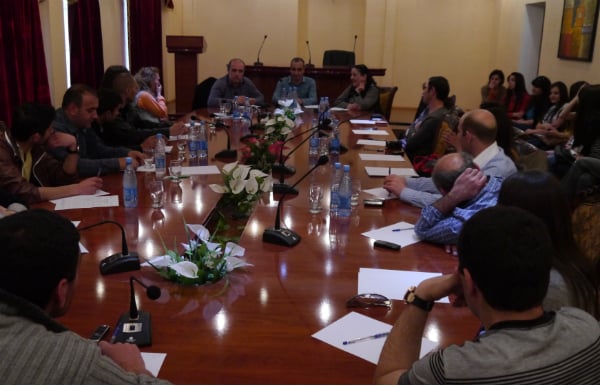
Lradadar Club, one of the initiatives in recent years of the Media Initiatives Center, is an informal gathering for professional discussions on the media for journalists and others working in news media. Those participating in the discussions are people in the industry: journalists, editors, directors, managers, critics, analysts. Lradadar is a unique self-regulation tool for journalists.
This time Lradadar was in Vanadzor. The topic of discussion was relations with the local self-governing bodies. The occasion was an incident [AM] that occurred during a Vanadzor City Council meeting in which a journalist and council member hurled insults [AM] at one another.
Media.am summarized the opinions made at the discussion and presents them below in point form.
On the work of journalists in the regions and relations with local self-governing bodies in general
- In the regions, it’s easier to criticize the central, state authorities than the local authorities. This is an unwritten rule in Armenia.
- Unfortunately, there are few journalists in the regions that monitor and cover the work of local self-governing authorities.
- Journalists are those through whom local self-governing authorities have to be accountable to the public.
- The interest of journalists is often perceived very keenly by local authorities because they sense that the consequences can be dangerous for them.
What a journalist covering a city council meeting must know
- A city council meeting is open [to the public and the media]. In order to have a meeting behind closed doors, 2/3 of the council has to vote in favor.
- Journalists do not require accreditation for city council meetings.
- Neither the mayor nor the city council can adopt a legislative norm that restricts the rights of journalists.
- Even if the city council meeting is closed doors, the decisions adopted must be made public.
- City council meetings are chaired by the mayor, and if order has been breached, the journalist shouldn’t enter into an argument but appeal to the meeting chair and ask that order be restored.
On the incident between the council member and journalist at a Vanadzor City Council meeting
- The actions of the journalist and council member at the Vanadzor City Coucnil meeting cannot be considered equal, since if there wasn’t a violation of the rules of procedure during the meeting and the inappropriate remark directed at the journalist, then there also wouldn’t be its continuation. It’s obvious that the first to cross the unacceptable boundary was the council member.
- To avoid such incidents [in the future], it’s advisable that both the editorial office and the city council have rules and regulations.
- The work of journalists covering the city council meeting can be regulated, but those regulations should not restrict but facilitate the work of journalists.
- The rules of procedure bring all news outlets covering the city council meeting to a level playing field and rule out privileged status. But regulation of the work of news media must be within reasonable standards.
- RA Criminal Code Article 164 considers interfering with a journalist’s professional, lawful duties to be a crime. Journalists must know this and remind those who interfere with their work.
- The culture of apology is very important in all areas, including relations between the media and state agencies.
On the journalism community in Vanadzor and solidarity
- The journalism community in Vanadzor is not united, but in isolated cases, journalists succeed in uniting to protect their interests.
- The absolute majority of journalists serve local oligarchs and the journalism community from the start couldn’t have been united.
- Solidarity among journalists can be around principles: rules, agreements. Solidarity cannot be homogenous, as journalists also think differently. For example, the journalism community cannot defend a journalist if the journalist committed a crime.
P.S. The names of those who made the comments are not noted; they represent the general spirit of the discussion.

Add new comment
Comments by Media.am readers become public after moderation. We urge our readers not to leave anonymous comments. It’s always nice to know with whom one is speaking.
We do not publish comments that contain profanities, non-normative lexicon, personal attacks or threats. We do not publish comments that spread hate.